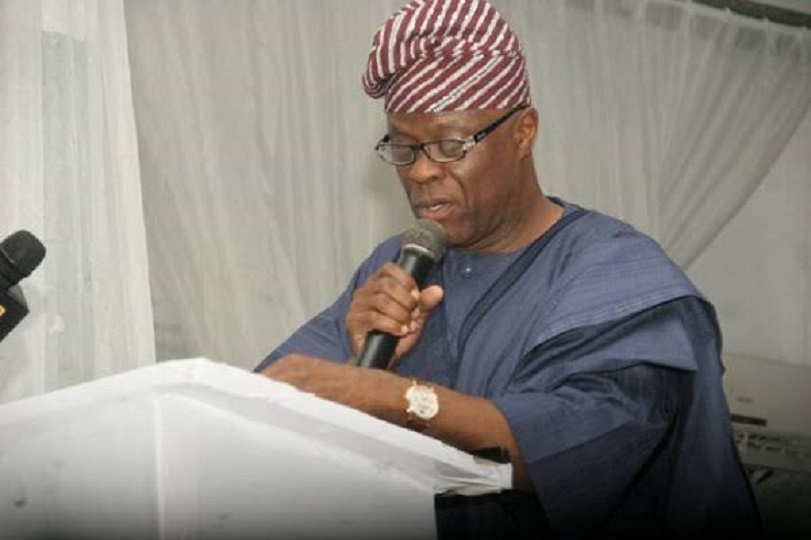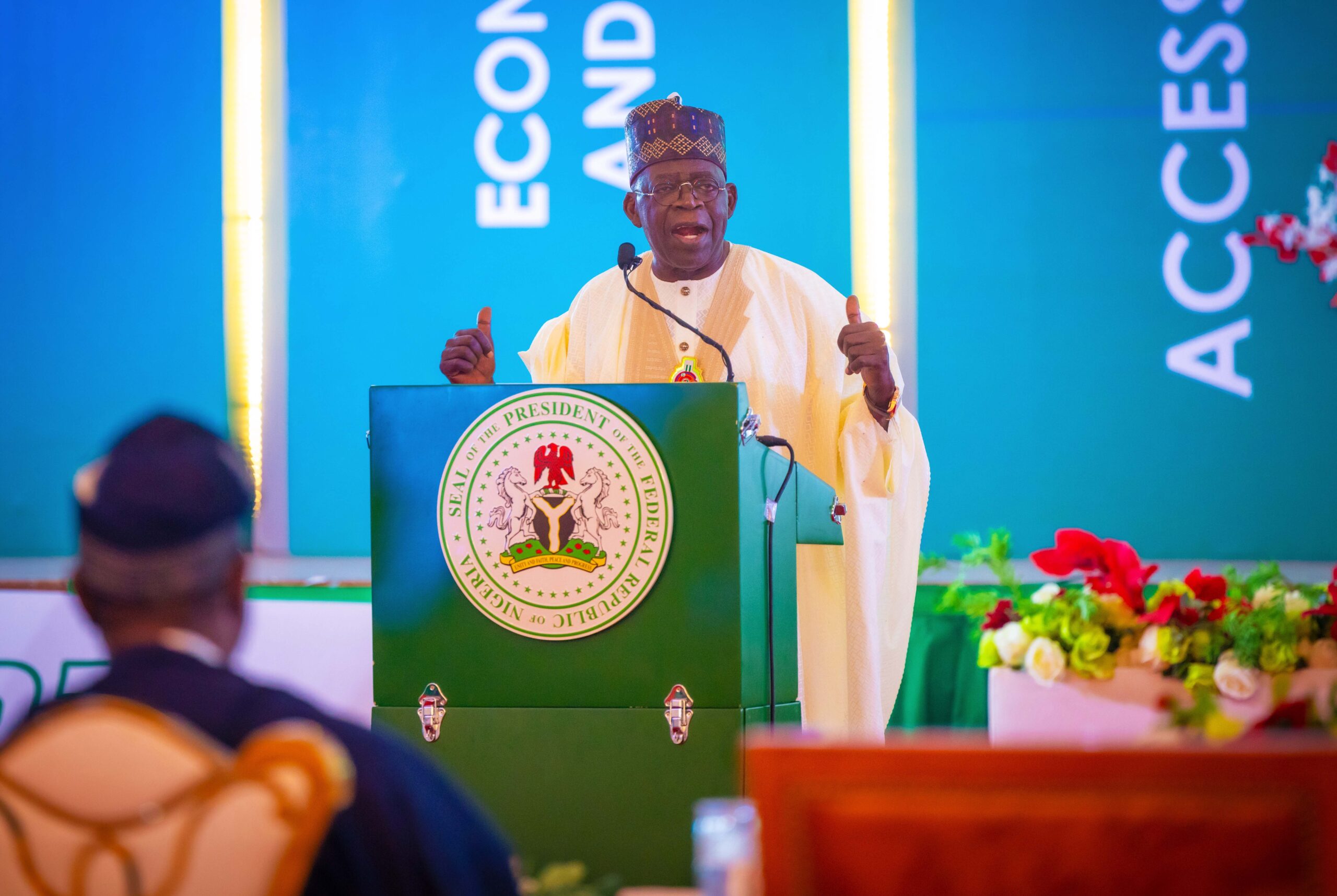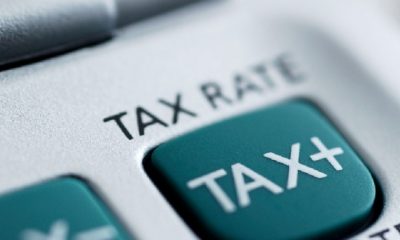Economy
VAIDS Aimed to Correct Nigeria’s Poor Tax to GDP Ratio—Finance Minister


By Dipo Olowookere
Minister of Finance, Mrs Kemi Adeosun, has disclosed that the Voluntary Asset and Income Declaration Scheme (VAIDS), which was launched recently in Abuja by the Federal Government, is a credible platform put in place for defaulting Nigerian taxpayers to work out a flexible way to pay their outstanding tax liabilities due from them relating to the last six relevant tax years, regularize their tax transactions and obtain genuine tax clearance certificate for all the relevant years without fear of criminal prosecution for tax offences and with the benefit of forgiveness of interest and penalties.
According to the Minister, the scheme offers a 9-month window to allow Nigerians, who may have evaded tax, whether ignorantly or deliberately, in the past six years, the opportunity to do their civic duty and pay the correct taxes, thereby avoiding criminal prosecution at the expiration of the scheme.
Speaking in Abuja shortly after the VAIDS was launched by the Acting President, Professor Yemi Osinbajo, last week, Mrs Adeosun stated that the policy embraces all federal and state taxes such as Companies Income Tax, Personal Income Tax, Petroleum Profits Tax, Capital Gains Tax, Stamp Duties, Tertiary Education Tax, Technology Tax, Tenement Rates, and Property Taxes.
It also covers all back taxes for the last six years in line with the statutory periods of limitation under the relevant tax statutes, she added.
“VAIDS is specifically targeted at taxpayers who have not been fully declaring their taxable income/assets; have not been paying the tax due at all; have been underpaying or under remitting; are under a process of tax audits or investigations with the Relevant Tax Authority; are engaged in tax disputes with the relevant tax authority but are prepared to settle the tax dispute out of court; are new taxpayers who are yet to register with the tax authorities; and are existing registered taxpayers who have new disclosures to make.
“It does not matter whether the relevant tax default arose from undeclared assets within or outside the country.
“If tax should have been paid, VAIDS is providing a once in a lifetime opportunity to declare the tax outstanding and resolve it definitively,” the Minister said.
She further disclosed that one great benefit of participating in the scheme is that taxpayers would be free to transfer assets that they had previously held in nominee and other names into their own name.
“Many Nigerians have lost assets in the course of trying to conceal them from the authorities. Such losses typically occur in the event of death or an urgent need to liquidate assets when required documentation and proof of ownership cannot be provided.
“The global focus on illicit financial flows is such that global regulations will only become tighter with time, thus this opportunity to regularise ownership of assets should be seized as proper declaration allows assets to be legally and formally held by the true owner.
“Those taking advantage of the scheme by declaring honestly and fully will be free from prosecution and will qualify for forgiveness of penalties and interest,” Mrs Adeosun explained.
Upon expiration of the VAIDS programme in March 2018, government will concentrate criminal prosecution efforts on those who have evaded taxes and yet failed to take advantage of the scheme.
Under the various relevant laws, tax evasion is a crime, which is punishable upon conviction by imprisonment of up to 5 years, while the tax payer is still liable to pay the tax due with interest and penalties.
In most cases, defaulters are subject to a penalty of 10 percent of the tax due and interest at 21 percent per annum. In some cases the penalty is 100 percent of the tax due and the defaulters’ assets are liable to be forfeited.
“Those who fail to take advantage of the scheme and are later found to have under declared their taxes or assets will be treated as wilful tax evaders and will therefore face the full force of the law and will not be shielded by anonymity,” Mrs Adeosun stated.
The Minister also clarified that VAIDS was not restricted to overseas income and assets, as it also covers income derived from part-time businesses, vocations, professions and economic activities other than the main or principal sources of incomes accruing to taxpayers.
These include annuities, yields, and other incidental incomes derived from investments such as rentals on residential and commercial properties, cash and non-cash investments and investments in other asset classes.
“The idea of the scheme is that it is a voluntary programme, the decision to participate should therefore be left to the taxpayers.
“The FIRS and other relevant federal and states tax authorities shall give effective publicity to the program and encourage as many people as possible to take advantage of it.
“This will also be complemented by the Community Tax Liaison Officers. Intending participants in the scheme are advised to confirm the extent of their Nigerian tax liabilities with their professional advisers,” she stated.
Mrs Adeosun, who decried Nigeria’s low tax revenues which, according to her, are at variance with the lifestyles of a large number of its people and with the value of assets known to be owned by Nigerians resident around the world, said there has been a systemic breakdown of compliance with the tax system with various strategies used to evade tax obligations.
These include but are not limited to, transfer of assets overseas, the use of offshore companies in tax havens to secure assets, and the registration of assets in nominee names.
“Nigeria’s tax to GDP ratio, at just 6 percent, is one of the lowest in the world (compared to India’s of 16 percent, Ghana’s of 15.9 percent, and South Africa’s of 27 percent).
“Most developed nations have tax to GDP ratios of between 32 percent and 35 percent. Whilst considerable progress has been made with taxing those in formal employment, self-employed persons, professionals and companies are able to evade full tax payment due to the inability of the tax authorities to access and assess their true income.
“According to Federal Inland Revenue Service the total number of tax payers in Nigeria is just 12,649,654 [as at April 2017]. Of these, 96 percent have their taxes deducted at source under PAYE and just 4 percent comply with Direct Assessment,” she said.
Economy
Lokpobiri Begs Lawmakers to Reschedule Oil Revenue Executive Order Probe

By Adedapo Adesanya
A joint National Assembly probe into President Bola Tinubu’s new oil revenue executive order was stalled on Thursday following a request for more time by the Minister of Petroleum Resources, Mr Heineken Lokpobiri.
The hearing was convened to scrutinise the executive order directing that royalty oil, tax oil, profit oil, profit gas and other revenues due to the Federation under various petroleum contracts be paid directly into the Federation Account.
Mr Lokpobiri told lawmakers that although he attended out of respect for parliament, he had been notified of the hearing only a day earlier and had not obtained all the relevant documents needed to defend the policy adequately.
He appealed for the session to be rescheduled.
Co-chairman of the joint committee and Chairman of the Senate Committee on Gas, Mr Agom Jarigbe, put the request to a voice vote, and lawmakers approved the adjournment.
A new date is expected to be communicated to the minister.
The executive order signed last week also scrapped the 30 per cent Frontier Exploration Fund created under the Petroleum Industry Act (PIA) and discontinued the 30 per cent management fee on profit oil and profit gas previously retained by the Nigerian National Petroleum Company (NNPC) Limited.
Anchored on Sections 5 and 44(3) of the Constitution, the presidency said the directive was aimed at safeguarding oil and gas revenues, curbing excessive deductions and restoring the constitutional entitlements of federal, state and local governments to the
However, the order has sparked criticism within the industry, one of which was from the Petroleum and Natural Gas Senior Staff Association of Nigeria (PENGASSAN), whose president, Mr Festus Osifo, called for an immediate withdrawal of the order, warning that it could undermine the PIA and erode investor confidence.
Meanwhile, at another session, the Chairman of the Senate Committee on Finance, Senator Mohammed Sani Musa, disclosed that President Tinubu would soon transmit proposals to amend certain provisions of the PIA to align with current economic realities.
He noted that while many expect the executive order to boost revenue automatically, Nigeria has yet to achieve its desired income levels.
He did not specify which sections of the law would be targeted, but suggested that the drive to enhance revenue generation would necessitate legislative adjustments.
The PIA, signed into law in 2021 by the late ex-President Muhammadu Buhari, overhauled the governance, regulatory and fiscal framework of Nigeria’s oil and gas sector, commercialised the NNPC and restructured revenue-sharing arrangements.
Economy
NGX Group Declares N2 Final Dividend, 1-for-3 Bonus Issue for FY’25

By Aduragbemi Omiyale
Shareholders of Nigerian Exchange (NGX) Group Plc will receive one new share for every three held as of April 10, 2026, as a bonus, according to a proposal from the board.
This is in addition to a final dividend of N2.00 proposed by the board to shareholders for the 2025 fiscal year, which raised the total dividend for the year to N3.00, according to the financial statements of the company filed with NGX Limited.
Last year, NGX Group recorded a sterling performance, with its earnings growing by 36.0 per cent to N22.9 billion from N16.9 billion due to sustained growth across core business segments, improved customer penetration on the back of increased investor activity and rising investor confidence.
The operating profit in the year increased by 44.4 per cent to N11.8 billion, while pre-tax profit jumped to N15.6 billion from N13.6 billion in 2024, with the earnings per share (EPS) at N4.75.
As for its balance sheet, total assets increased to N71.0 billion from N68.0 billion, while shareholders’ equity strengthened to N55.2 billion
The improved debt-to-equity position reflects a conservative capital structure, enhanced solvency profile, and strong retained earnings growth.
“Our 2025 performance demonstrates the resilience of our business model and the effectiveness of disciplined strategic execution. Strong revenue growth, improved operating margins and a strengthened balance sheet reinforce our commitment to delivering sustainable long-term shareholder value.
“The increased dividend and bonus issue reflect the Board’s confidence in the sustainability of our earnings and the robustness of our capital position as we continue to deepen Nigeria’s capital markets.
“We are confident that the momentum that we have built in 2025 will be sustained, given investor confidence in the Nigerian capital market and a pipeline of exciting new listings that will broaden and deepen the market,” the chairman of NGX Group, Mr Umaru Kwairanga, said.
On his part, the chief executive of the organisation, Mr Temi Popoola, said, “We delivered strong top-line growth and enhanced profitability in 2025 despite macroeconomic headwinds.
“Our 36 per cent core revenue growth, improved operating efficiency and successful deleveraging have strengthened our capital base and financial flexibility, supporting the increased dividend and bonus issuance.
“As regulatory standards evolve, including the recent upward review of minimum capital requirements by the Securities and Exchange Commission (SEC), our robust balance sheet positions us to meet new thresholds seamlessly while continuing to invest in liquidity expansion, product innovation and market infrastructure to build a resilient, globally competitive exchange group.”
Economy
FG Targets Credit Access For 50% Workers By 2030

By Adedapo Adesanya
The Vice President, Mr Kashim Shettima, inaugurated the Board of the Nigerian Consumer Credit Corporation (CREDICORP) and gave a 50 per cent access target for workers, saying consumer credit was critical to Nigeria’s ambition of becoming a one-trillion-dollar economy by 2030.
According to him, President Bola Tinubu established the CREDICORP to build a trusted credit infrastructure, provide catalytic capital to lower borrowing costs, and help Nigerians overcome long-standing cultural resistance to credit.
Speaking on Thursday in Abuja when he inaugurated the board on behalf of the President, the Vice President, in a statement by his spokesman, Mr Stanley Nkwocha, said that the quality of life of Nigerians cannot improve without closing the gap between access to capital and human dignity.
“A civil servant who earns honestly does not have to chase sudden wealth just to buy a vehicle, or save for ten years to buy one. A young professional should not remain in darkness simply because solar power must be paid for all at once,” the Vice President said.
VP Shettima disclosed that in just one year of operations, CREDICORP has disbursed over ₦37 billion in consumer credit to more than 200,000 Nigerians, with over half of them accessing formal credit for the first time.
The Vice President said the organisation was specifically tasked with building credit infrastructure to bridge the trust gap between lenders and borrowers, providing wholesale capital and credit guarantees through its portfolio company.
“Ultimately, these critical jobs of CREDICORP will enable access to consumer credit to at least 50 per cent of working Nigerians by 2030,” he said.
The Vice President explained that the new board’s role was not ceremonial as they are custodians of the organisation’s mission, adding that the long-term strength of the institution would depend on their “vigilance, integrity, sacrifice, and commitment.”
He directed Board members to uphold Public Service Rules, the Board Charter, and all applicable governance frameworks, warning that accountability and stewardship of public resources were non-negotiable.
The Chairman of CREDICORP, Mr Aderemi Abdul, expressed appreciation to President Tinubu for his vision behind the formation of CREDICORP and for the confidence reposed in them, noting that the establishment of the corporation marked an important step towards strengthening the nation’s financial architecture.
He assured President Tinubu that the board understands its responsibility and will guide the institution to deliver meaningful benefits to Nigerians.
For his part, Mr Uzoma Nwagba, Managing Director/CEO of CREDICORP, recalled watching President Tinubu say 20 years ago that consumer credit is one of the major tools that will improve the lives of Nigerians.
He noted that over the past 18 months, the institution has benefited more than 200,000 Nigerians, including students.
He assured that the presidential vision behind CREDICORP would not be taken lightly, as the team considers their appointments a unique, once-in-a-lifetime opportunity.
Other members of the board inaugurated include Mrs Olanike Kolawole, Executive Director, Operations; Mrs Aisha Abdullahi, Executive Director, Credit and Portfolio Management; Mr Armstrong Ume-Takang (MD, MoFI), Representative of MoFI; Mrs Bisoye Coke-Odusote (DG, NIMC), Representative of NIMC; and Mr Mohammed Naziru Abbas, Representative of FMITI.
Others are Mr Marvin Nadah, Representative of FCCPC; Mrs Chinonyelum Ndidi, Representative of the Federal Ministry of Finance; Mr Mohammed Abbas Jega, Independent Director; and Mrs Toyin Adeniji, Independent Director.
-

 Feature/OPED6 years ago
Feature/OPED6 years agoDavos was Different this year
-
Travel/Tourism10 years ago
Lagos Seals Western Lodge Hotel In Ikorodu
-

 Showbiz3 years ago
Showbiz3 years agoEstranged Lover Releases Videos of Empress Njamah Bathing
-

 Banking8 years ago
Banking8 years agoSort Codes of GTBank Branches in Nigeria
-

 Economy3 years ago
Economy3 years agoSubsidy Removal: CNG at N130 Per Litre Cheaper Than Petrol—IPMAN
-

 Banking3 years ago
Banking3 years agoSort Codes of UBA Branches in Nigeria
-

 Banking3 years ago
Banking3 years agoFirst Bank Announces Planned Downtime
-

 Sports3 years ago
Sports3 years agoHighest Paid Nigerian Footballer – How Much Do Nigerian Footballers Earn





















